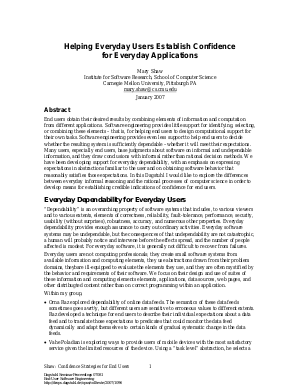Helping Everday Users Establish Confidence for Everyday Applications
Author Mary Shaw
-
Part of:
Volume:
Dagstuhl Seminar Proceedings, Volume 7081
Part of: Series: Dagstuhl Seminar Proceedings (DagSemProc) - License:
 Creative Commons Attribution 4.0 International license
Creative Commons Attribution 4.0 International license
- Publication Date: 2007-07-03
File

PDF
DagSemProc.07081.18.pdf
- Filesize: 28 kB
- 3 pages
Document Identifiers
Subject Classification
Keywords
- Everyday users
- everyday dependability
- data feeds
- task level of abstraction
- topes
Metrics
- Access Statistics
-
Total Accesses (updated on a weekly basis)
0Document
0Metadata
Abstract
End users obtain their desired results by combining elements of information and computation from different applications. Software engineering provides little support for identifying, selecting, or combining these elements – that is, for helping end users to design computational support for their own tasks. Software engineering provides even less support to help end users to decide whether the resulting system is sufficiently dependable – whether it will meet their expectations. Many users, especially end users, base judgments about software on informal and undependable information, and they draw conclusions with informal rather than rational decision methods. We have been developing support for everyday dependability, with an emphasis on expressing expectations in abstractions familiar to the user and on obtaining software behavior that reasonably satisfies those expectations. In this Dagstuhl I would like to explore the differences between everyday informal reasoning and the rational processes of computer science in order to develop means for establishing credible indications of confidence for end users.
Cite As Get BibTex
Mary Shaw. Helping Everday Users Establish Confidence for Everyday Applications. In End-User Software Engineering. Dagstuhl Seminar Proceedings, Volume 7081, pp. 1-3, Schloss Dagstuhl – Leibniz-Zentrum für Informatik (2007)
https://doi.org/10.4230/DagSemProc.07081.18
BibTex
@InProceedings{shaw:DagSemProc.07081.18,
author = {Shaw, Mary},
title = {{Helping Everday Users Establish Confidence for Everyday Applications}},
booktitle = {End-User Software Engineering},
pages = {1--3},
series = {Dagstuhl Seminar Proceedings (DagSemProc)},
ISSN = {1862-4405},
year = {2007},
volume = {7081},
editor = {Margaret H. Burnett and Gregor Engels and Brad A. Myers and Gregg Rothermel},
publisher = {Schloss Dagstuhl -- Leibniz-Zentrum f{\"u}r Informatik},
address = {Dagstuhl, Germany},
URL = {https://drops.dagstuhl.de/entities/document/10.4230/DagSemProc.07081.18},
URN = {urn:nbn:de:0030-drops-10968},
doi = {10.4230/DagSemProc.07081.18},
annote = {Keywords: Everyday users, everyday dependability, data feeds, task level of abstraction, topes}
}
